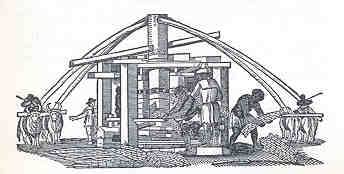 | Sugar Mill original source unknown Scanned from: |
H-NET List forAfrican History and Culture [H-AFRICA@H-NET.MSU.EDU]
Date: Mon, 22 Nov 1999
From: Kenneth Harrow, MSU
<
. . . slavery can not be
understoodindependently of economic circumstances. again,
as anon-historian, i will make the following claim based on
my readings ofthe experts themselves who have stated that
the march ofthe sugar cane production system, from the e.
mediterraneanto w. mediterranean, to the islands near spain
(13-14th c.),and then, a century or two later, down the w.
african coastto such islands as fernando po, brought within
the proximityof africa an economic system that demanded
large numbersof agricultural workers who could harvest the
cropcollectively.
thetransformation of sugar cane into sugar and then rum was
systematizedand developed as an industry, even with
industrialsecrets. it was spread across the atlantic to
brazil by thesame portuguese who had instituted the
plantationsystem in the islands off the african coast. and
then, finally,it was spread by the dutch in the 1620-40
sugar canerevolution period into the w. indies.
slavery tookits form, its inhuman form, and spread to
specificlocations, because the economic system it served
requiredcertain kinds of labor which were easiest met by
using slaves.
does it makeany sense, then, to talk about where slavery
began? abouthow it existed in greece, egypt, russia, or
ghana, as ifthe term slavery meant the very same thing?
finally, it isnot my intention to exculpate people in the
past whocarried out such evil practices by claiming that
economicsystems were responsible. it is just that one
cannotunderstand their actions, motivations, practices
withoutunderstanding what economic incentives were being
served.